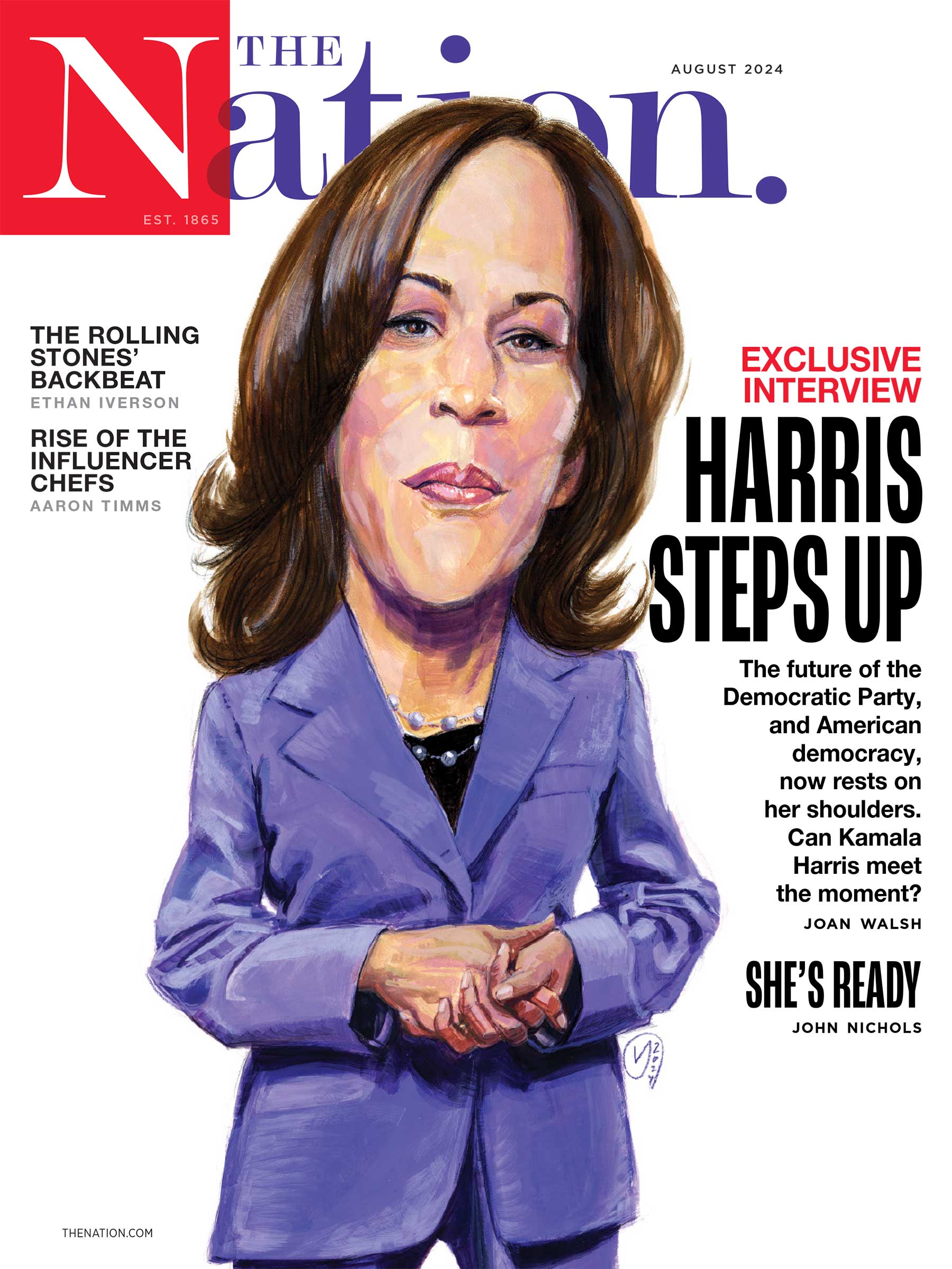
[ad_1]
Politics
/
August 23, 2024
Expect the GOP to flood the zone with polls that likely aren’t worth the paper they’re written on.

Former Republican gubernatorial candidate Kari Lake watches a prerecorded video of former president Donald Trump giving Lake his endorsement in the race for the seat of Senator Kyrsten Sinema (I-AZ) on October 10, 2023, at JetSet Magazine’s offices in Scottsdale, Arizona.
(Photo by Rebecca Noble / Getty Images)
Earlier this month, Newsweek and other reputable media outlets covered the latest Peak Insights poll on the Arizona Senate race with hyperbolic statements about it being good news for Kari Lake. The GOP candidate has frittered away her ability to win over a critical mass of moderates by spending the nearly two years since her defeat in the 2022 gubernatorial race spewing Trump-styled election denialism and conspiracy theories. So polling in her favor, and against her Democratic challenger, Ruben Gallego, who has meticulously built a lead against Lake, was just the right bit of news to spice up the horse-race reportage.
The only problem was that the Peak Insights poll was paid for by the National Republican Senatorial Committee, and was way out of whack with most other recent polls—a minor inconvenience largely ignored in Newsweek’s coverage. In fact, a High Ground poll recently found Gallego up 11 percent,; a New York Times poll had Gallego up about 8 percent, Noble Predictive Insights had Gallego up 7 percent, and Redfield & Wilton Strategies had the Democrat up by more than 5 percent. The one other poll that produced results anywhere close to that of the Peak Insights poll was by WPA Intelligence, which had Gallego up by only 2 percent. But it turns out that that poll, too, was partisan, and paid for by the GOP-aligned super PAC, the Club for Growth Action.
Trying to skew the polling average by throwing in outlier polls such as Peak Insights’ is among the more unsavory developments of recent election cycles. Both parties have looked to game the system this way in the hopes of presenting momentum shifts to jazz up their base. Two years ago, Democrats withdrew from the race against conservative Utah Senator Mike Lee and threw their weight behind independent challenger Evan McMullin. Realistically, McMullin was never going to defeat Lee. Yet for a few weeks in the run-up to the 2022 election, some Democratic-aligned pollsters produced numbers showing that he was competitive with the incumbent senator. In the end, Lee won by more than 10 percent.
In the battleground states of the desert West, it is GOP-aligned and funded pollsters that seem to be on a tear, with their release of low-quality polls far out of whack with an array of nonpartisan surveys this election cycle.
In Arizona, says Mike Noble, of Predictive Insights, the reputable polling companies have all shown the presidential race to be tightening, with some polls giving Harris a small lead and others giving Trump the edge. Noble’s latest numbers, part of a rolling survey he releases on a quarterly basis, show Trump narrowly ahead; but, he says, that’s not terribly out of line with the New York Times poll showing Harris pulling ahead.
Current Issue

“They’re all telling you the same thing,” he explains. “Arizona is incredibly close, incredibly competitive.”
Moreover, his numbers show that, whereas in the spring and early summer a majority of Democrats in the state were thinking about their ballot in terms of voting against Trump rather than for Biden, since the president announced that he wouldn’t seek reelection and stood aside for Kamala Harris, there’s been a marked shift among Democrats. Now, a majority of Democrats in the state say they are voting for Harris rather than simply in opposition to Trump. That, Noble believes, shows a huge shift in enthusiasm toward the Democrats. Harris has, according to these polls, narrowed or eliminated the gap both in a scenario in which Robert F. Kennedy Jr. remains in the race, and in a one-on-one contest with Trump.
Those same polls that show the presidential race to be basically a toss-up in the state have consistently shown Kari Lake, who has burned a huge number of bridges in the past couple years, to be lagging several points behind Trump. And Noble believes that Gallego likely has an even bigger lead than the polling averages suggest, since the polls put out by GOP-affiliated pollsters are skewing the numbers in Lake’s favor and allowing her to put out press releases and fundraising e-mails arguing that the race is still a toss-up.
A similar story is unfolding in neighboring Nevada. There, independent pollsters have consistently found that incumbent Democratic Senator Jackie Rosen has consolidated a comfortable lead over her GOP challenger, Sam Brown. But the polling averages are skewed by numbers generated by Remington Research Group, whose Nevada polling is paid for by the American Fuel and Petrochemical Manufacturers, another GOP-affiliated political action committee, and which has found Rosen’s lead to be only 2 percent.
This is, Noble argues, a direct consequence of the Supreme Court’s Citizens United decision. The 2010 ruling opened the floodgates for outside spending by companies and lobbyists looking to impact elections, oftentimes in deeply underhanded ways. “When you’re playing at this high-stakes level for power, and the rules say you can do it, why not?” the pollster says. The result is “polls that may not reflect the actual realities.”
If Georgia, with its newly minted super-partisan board of elections, is now ground zero for election-deniers seeking to foul up the vote count and certification, should it look like Trump is heading for another defeat, Arizona and Nevada might well be ground zero for using partisan polling to muddy the waters.
“This election’s going to get weirder before it gets more normal,” Noble says. And, as it does so, expect the GOP to flood the zone with polls on Lake’s and Brown’s Senate prospects—and quite possibly Trump’s prospects in key swing states—that likely aren’t worth the paper they’re written on.
Can we count on you?
In the coming election, the fate of our democracy and fundamental civil rights are on the ballot. The conservative architects of Project 2025 are scheming to institutionalize Donald Trump’s authoritarian vision across all levels of government if he should win.
We’ve already seen events that fill us with both dread and cautious optimism—throughout it all, The Nation has been a bulwark against misinformation and an advocate for bold, principled perspectives. Our dedicated writers have sat down with Kamala Harris and Bernie Sanders for interviews, unpacked the shallow right-wing populist appeals of J.D. Vance, and debated the pathway for a Democratic victory in November.
Stories like these and the one you just read are vital at this critical juncture in our country’s history. Now more than ever, we need clear-eyed and deeply reported independent journalism to make sense of the headlines and sort fact from fiction. Donate today and join our 160-year legacy of speaking truth to power and uplifting the voices of grassroots advocates.
Throughout 2024 and what is likely the defining election of our lifetimes, we need your support to continue publishing the insightful journalism you rely on.
Thank you,
The Editors of The Nation
Sasha Abramsky
Sasha Abramsky, who writes regularly for The Nation, is the author of several books, including Inside Obama’s Brain, The American Way of Poverty, The House of 20,000 Books, Jumping at Shadows, and, most recently, Little Wonder: The Fabulous Story of Lottie Dod, the World’s First Female Sports Superstar. Subscribe to The Abramsky Report, a weekly, subscription-based political column, here.
More from The Nation


The independent candidate announced his withdrawal from the presidential election in key swing states—and his endorsement of the Republican ticket.
Chris Lehmann

Joy was everywhere—as long as you didn’t think about Gaza.
Adam Johnson

Men are in a crisis, for sure. But JD Vance is not the example of masculinity that those who are lost should follow.
Ginny Hogan
[ad_2]